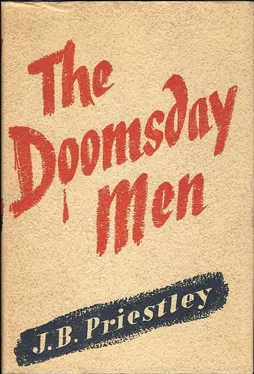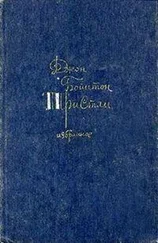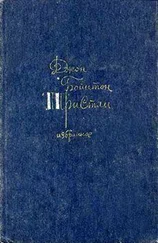– say something about it once-and it sounded frightening-he can be very frightening.”
He felt her tremble, and gathered her closer to him and comforted her, so that nothing more was said for several minutes. Then, as she stayed quiet with her head resting against his arm, she asked: “Is that all he said?”
“No, there was something else.”
“What was it?”
“He was very serious, and said that if I felt it was the real thing between us, I must marry you as soon as I could, to take you out of this, right away, because he felt there was something wrong. And I told him that I knew there was something wrong, and that you weren’t happy-he’d said that he knew you weren’t happy, except to-day. He knew you were different to-day as soon as he saw you, happy for once. You are, aren’t you, Andrea?”
“Yes, I think this is the only happy day I’ve had since I’ve been grown up,” she replied slowly. “Only bits before. There were some bits that week at Beaulieu, especially the last day. But to-day I’ve been really happy-I meant to be-and now you’re spoiling it.” She was almost ready to cry.
But he continued doggedly, for he felt that it was now or perhaps never: “I told him I knew there was something wrong, something, I meant, that was making you unhappy, and that I was here to find out what it was.”
She struggled away from him, and looked at him reproachfully. “I thought you were here-because-you cared for me-and wanted to be with me.”
“It’s because I feel like that, I must know what’s wrong. I knew from the first, from the very first time we played tennis together, that there was something wrong, that you weren’t your real self, that you were wearing a sort of mask, and behind it were very bewildered and unhappy. And then you talked such bitter stuff, about nothing being any good.”
“But I believe it, can’t you see?” she cried.
“You can't believe it,” he told her, almost angrily. Then he caught her to him, fiercely. “Is this no good? Is what I feel about you no good? Don’t you really care anything about me?”
“You know I do,” she flashed at him. “I shouldn’t be here if I didn’t. Look!” And she kissed him as fiercely as he had pulled her towards him. “Do you think I’d do that to any man? If you want to know, this is the very first time I’ve behaved like this. And do you think I wanted to go off like that at Beaulieu, when you looked so puzzled and miserable, poor darling? I don’t care now, I’ll admit it. I’ve been thinking about you too ever since that time. I’ve talked to you for hours and hours. I’ve written dozens of long letters to you and torn them up. I’ve stared at the miserable little map of England trying to find you. I had the London Times sent up from Los Angeles, just to read the tennis reports to see if you’d been playing. And if it could be any use, if this world was all different, I’d go anywhere with you-now. How can you ask if I care about you?”
It took him a moment or two to recover from the effects, very mixed, confusing, rich, of this tremendous outburst, which revealed to him at last, in flashing full-length, the deeply feminine, fiery-hearted girl he had thought must exist behind the mask at Beaulieu. She was almost terrifying, yet still delicious, adorable.
“But then, don’t you see, if that’s how you can feel, that it’s absolutely crazy to talk as if everything were useless, no good, better done with? It doesn’t make sense at all, Andrea.”
“Yes, it does.” And he noticed, with an odd pang of remembrance how she reverted to the very same quick harsh tone she had used in that restaurant at Beaulieu. “We’ve been happy to-day-yes-and might be happy like this for some time-”
“But of course. And with a place of our own. And children-don’t you like children?”
She gave a quick shiver that told him in a flash what he wanted to know, and he guessed at once that here was no girl who would try to avoid motherhood, that there was in her an immense, deep, dark well of maternal feeling he could not even begin to understand. But any sudden gleam of delight and tenderness soon died out of her face, and she looked at him and answered him bleakly.
“Yes, we could be happy for a time. But it wouldn’t last. You’d fall out of love with me. Or one of us would be ill-suffer pain-perhaps die young-as my mother must have done. We’d be sorry then it had gone on. We’d wish we’d had this day and no more. Even if there were children, there’d be a war or something, to take them away, or they’d grow up to dislike us. There’s always something wrong. People can’t live in peace and happily together-there’s nothing but misery in the end. You remember what I said about this view, how good it was simply because there were no people to spoil it, as they spoil everything, even for themselves. It isn’t that I hate people-I know I’m just one of them myself-they can’t help it-we all can’t help it apparently-it’s just the wrong way we’ve been made. There’s good in us, wanting to love, to look after helpless little things, to enjoy the sun and the mountains and the sea, books and music and painting and fun, but it doesn’t get a chance, because there’s too much bad in us, and though we may try and try, all that happens is that there’s more ugliness and pain and misery and fear and hate. You can’t deny it, Malcolm. Look at what’s happening all over the world. You know more about that than I do, for I don’t care any more; I haven’t time to waste even reading any more about their armies and navies and bombing planes and spies and executions; but I know everything’s getting worse. Oh!-can’t you see how useless and wicked it all is-just more and more pain and misery? And I love you so much.”
And she pressed her wet cheek to his, passionately, groped for his hands and squeezed them, staring out at a sunlight she could no longer see. And never in his life before had he felt such a terrible tenderness as he did now, holding her close, and trying in vain to calm his mind, so that he might reason with her, not angrily, but calmly, gently. For now he felt that she was like a child who had been carefully taught a dreadful evil lesson, though there was still about the way she repeated it a certain nobility of her own, for the ugly ways of life, the pain and misery, against which she protested so fiercely, these were not hers, and she had only seen them from afar.
“You are telling me things you have heard over and over again,” he said to her quietly. “It isn’t really you talking. Deep down I doubt if you believe it.”
“I do. Really, I do.”
“No. And whether you do or not, it’s only half the truth. It’s one side, the darker side, of something that has to be two-sided, to have day as well as night. I too hate the way the world’s going-that is, in some directions, and I think we hear more about the wrong tracks than we do about the right ones. We’re not in Paradise, and have no right to expect to be. People fall out of love, children die, there are bestial wars, and everywhere there’s ugliness and pain and misery, just as everywhere the sun goes down and the night comes. But people also fall in love, as we’ve done, and children grow up happily, wars come to an end or are avoided, bits of ugliness disappear-and it’s our job not to whine that these things exist but to help them out of the world, and people have fun together, help each other in need, try to soften pain and drive away misery. Even now, in many ways, people are better than they were, and even if they aren’t, we can’t just sit about and moan that it’s all hopeless. It’s good-it’s grand and glorious-for us to sit here together-as you admit yourself-”
“Yes, my duck, I do,” she replied dreamily.
Читать дальше









